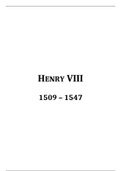Lecture notes
Henry VIII Revision Notes
Comprehensive Notes for AQA AS and A-Level History's Paper 1 - The Tudors (7041, 7042). These notes may also be useful for other exam boards, and have been broken down into bullet points. It contains everything you need to know, using three different textbooks. Notes on other Tudor monarchs ...
[Show more]




